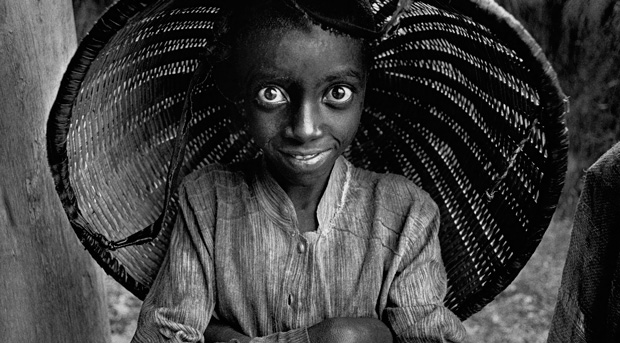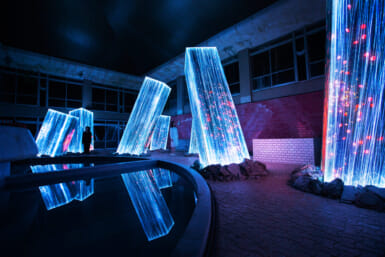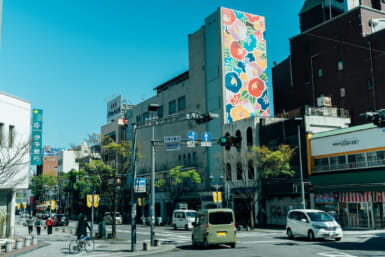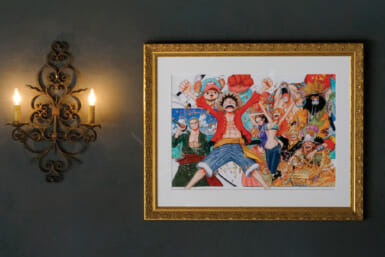by Owen Schaefer
Child worker at the Mata tea plantation.Rwanda,1991.
Photo by Sebastião Salgado / Amazonas images.
Organized by Lélia Wanick Salgado, exhibition curator.
Sometimes, shows like Sebastião Salgado’s Africa are presented as consciousness raisers―the literature offering to teach the gallery going public about places they will likely never visit. Places that need their help. The organizers of Africa hope that the show will help people to think differently, or perhaps begin to think for the first time, about the continent and the problems that have plagued it. But while the sentiments are admirable, and the photography incredible, the show offers little in the way of changing perceptions or throwing any particular clarity on a very, very big place.
Make no mistake, Salgado is a masterful photographer, as well as a conservationist, and practically a legend in photojournalism. He works solely in black and white, and on the continuum between art-photography and photojournalism, somehow spans both extremes effortlessly. So much so that it is easy to go through the Africa exhibition experiencing the horror, sympathy and laughter that his images evoke, and barely notice the incredible strength of composition in each.
In one photo, sunlight filters through the dust, casting beautiful beams on a group of tired and ragged Ethiopian refugees who have been walking all night to avoid being gunned down by planes. In another, a child’s body, wrapped for burial, lies on a stretched-out fur which, in the bold contrasts of black and white, seems to splash outward like a puddle of milk. There is a tension in even examining works like this―the curious guilt that comes with recognizing beauty in images of poverty or death, and also in knowing that the photographer recognized it too.
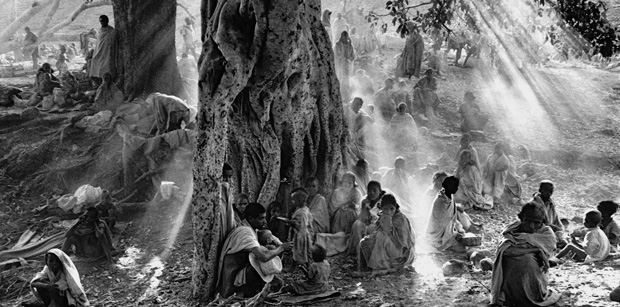 In the Kalema camp, west of Tigray, thousands of refugees have just arrived from an all-night
In the Kalema camp, west of Tigray, thousands of refugees have just arrived from an all-night
trek to avoid being machine-gunned by the MIGs of the Ethiopian air force.Ethiopia,1985.
Photo by Sebastião Salgado / Amazonas images.
Organized by Lélia Wanick Salgado, exhibition curator.
Salgado works in large scales. His major projects tend to focus on widereaching social issues, such as the Workers series, which looked at manual labor in 23 different countries, and Migrations, which went even broader, recording the vast numbers of families leaving their failing rural economies to move into the world’s growing urban sprawls, and others roaming into new countries due to war and genocide. In each of these projects, audiences are presented with a broad social phenomenon that can also be examined and understood at a local or even personal level.
But where the Africa exhibition goes wrong is by doing precisely the opposite: The ‘Africa’ we see in an image from Rwanda is not the Africa of Ghana or Angola. And any sense that there are African nations fighting for greater development and growth is lost entirely in this show. Instead, it indulges the developed world’s tendency to regard the entire African continent as if it were a single entity―a single problem to be solved. And it seeks to define a landmass that has already had too long a history of being defined from the outside.
Let’s face it, this is the Africa that viewers expect and even want to see: distant, exotic and dangerous. And Salgado’s photographic eye is second to none. The images in Africa are spectacular, and taken as a sampling of his work―a kind of ‘greatest hits’ which happen to have been shot on the world’s biggest continent―the exhibition is full of standout works that go from stunningly beautiful to heart-rending. But despite a purported agenda of public awareness, Africa does little to dispel the persistent generalizations that keep the public from seeing discrete national and regional issues. And taking on the problems of an entire continent is where most viewers will shake their heads, toss up their hands, and leave the gallery, wondering at the pity of it all.
Show: Sebastião Salgado: Africa (to Dec. 13)
Gallery: Tokyo Metropolitan Museum of Photography (Ebisu station)
Hours: 10am–6pm (Thu & Fri to 8pm)
Admission: ¥800 Tel: 03-3280-0099
www.syabi.com

